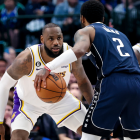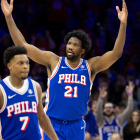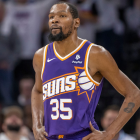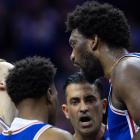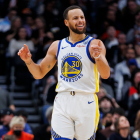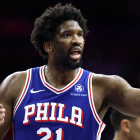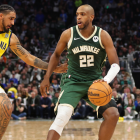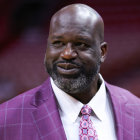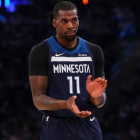
LeBron James almost certainly isn't going to play for the Dallas Mavericks next season, and the word "almost" almost didn't make it into this sentence. The fact that James doesn't have a no-trade clause and that the Mavericks are technically capable of constructing a legal trade package for him means that an infinitesimal possibility of a deal technically exists, but we can make this clear from the outset: there is no compelling reason to believe that James will play for the Mavericks next season despite his reported recruitment by Kyrie Irving.
The Lakers, at this point, have no reason to pursue a James trade. If they were going to do so, wouldn't they have looked into it last offseason, when they were coming off of a lottery season? Why give up a first-round pick to boost the roster around James in February only to turn around and deal him in July? The Lakers just reached the Western Conference finals. Their goal, at the time being, is to build on that success, not give away the player that made it possible.
Even if we could imagine a world in which the Lakers would consider a James trade, what would the Mavericks even have to offer? Dallas, at present, has two first-round picks available for trade. One of them is the No. 10 overall selection in June's draft, but the Lakers already pick at No. 17, so odds are, adding another pick in that same range wouldn't mean all that much to Los Angeles. The other will depend on when the Mavericks fulfill their final obligation to the New York Knicks in the Kristaps Porzingis trade, which would likely mean an unprotected pick in 2026. Otherwise? Their picks all either belong to other teams or are locked by the Stepien Rule.
Could the Mavericks theoretically build a package around players? Sure... but they don't have any good ones to trade. There's a reason that a team with Irving and Luka Doncic just missed the playoffs, after all. Josh Green and Jaden Hardy have upside, but they don't have "centerpiece of a LeBron James trade" upside.
It might not matter even if they did. Remember, a new collective bargaining agreement kicks in this summer. The 2023 CBA has made it far more difficult for expensive teams to add outside talent through trades. In the past, teams could always absorb 125% of the salary they sent out in trades. Starting this offseason, teams above the first tax apron, which the Mavericks would essentially be by default if they added James, can only absorb 110% of the salary they send out. That means that in order for Dallas to absorb the projected $46.9 million owed to James, they would have to give up roughly $42.6 million to the Lakers.
Dallas has $69 million or so in salary on its books owed to players not named Doncic, and those players aren't especially desirable. Doncic would get their attention, but in the likely event that he's off the table, the Lakers aren't going to be eager to accept a trade package of, say, Davis Bertans, Tim Hardaway Jr. and Maxi Kleber. And that incoming salary restriction only applies the problems that would come with acquiring James. Building around him is another story entirely.
The second apron is going to be significantly more punitive than the first. This offseason, the penalties are relatively minor, only preventing teams that pass it from using the taxpayer mid-level exception and signing players during buyout season. But starting in the 2024-25 season? The draconian measures kick in. No more salary aggregation in trades. No more trading cash. No more trading first-round picks seven years out, and if you stay above the second apron long enough, those picks get automatically shuttled to the bottom of the first-round. Building a roster under these circumstances essentially amounts to re-signing your own players with Bird Rights and signing free agents for the minimum. That's it, and that's no way to build a championship roster.
The trio of James, Irving and Doncic alone practically guarantees that the Mavericks would be above the second apron. Next season, the projected line would be roughly $180 million. Doncic will make $40 million. James is locked in at his max, and if Irving joins him, they'll each make a projected $46.9 million. That leaves around $46 million below that second apron line for their 12 remaining roster spots. Good luck building a viable supporting cast around two poor defenders and an impending 39-year-old with so little flexibility.
Could James and Irving make life a bit easier by taking pay cuts? Sure. James has a player-option for a projected $50.7 million in the 2024-25 season. He could decline it and take less a year from now, but James has never shown any willingness to leave money on the table. It is reportedly a matter of principle for him. When James did take a pay cut from 2010-2014, it set a precedent owners used to compel other superstars to leave money on the table. James is a former union vice president, and he takes issues like that seriously. The moment he leaves money on the table for the sake of roster-building, everybody else has to.
This is why the buyout path Bleacher Report's Chris Haynes suggested is unrealistic. James hasn't made a penny less than the max since 2015. He's not going to forego two years of max money only to sign in Dallas for whatever meager amount the Mavericks, as a team with two max players already in place, can legally offer.
Irving is a free agent this offseason, and therefore wouldn't even have to wait to take a pay cut. Given the uncertainty that generally follows him, the Mavericks would surely prefer it if he took one, with Marc Stein even reporting that Dallas "would prefer to sign Irving to the most team-friendly deal that the sides can agree upon." But that raises another question: if Irving is willing to leave money on the table... why wouldn't he just do it for the Lakers? As we've covered, the Lakers have pathways to roughly $34 million in cap space. James is already in place, and Anthony Davis provides sorely needed defense that Doncic does not. Los Angeles is a far more desirable market than Dallas. Irving was close to Kobe Bryant and some have speculated that wearing his mentor's uniform would matter to the star point guard. So once we've opened the door for an Irving pay cut, we have to acknowledge that the Lakers make more sense for this partnership than the Mavericks. Therefore, Dallas probably has to max Irving or come close just to make this alliance possible.
Here's where the player empowerment caveat starts to apply: when a star player wants a trade, he usually gets one, and when that player has a specific destination in mind, he usually gets there even if it makes less sense for his original team. But if James was planning a Los Angeles exit, he probably wouldn't have signed an extension last offseason. Even if things have changed over the past year, which seems unlikely with his son Bronny set to play for USC, there just isn't much reason to believe that James would force his way to Dallas, specifically.
Dallas his historically struggled to attract players. James has only played for his hometown team and two of the most desirable markets in the NBA. If he were to become available, far more appealing cities could make the Lakers far more appealing trade offers. Imagine a world in which the Warriors dangle all of their young players and draft picks for the chance to pair James with long-time rival Stephen Curry. Pat Riley once infamously said that he would "leave the key under the doormat" for James if he ever wanted to return to Miami, and the Lakers would be far more interested in a trade package built around Tyler Herro, Duncan Robinson and Miami's remaining draft capital than what the Mavericks could offer. Heck, we can't even rule out the pick-rich Knicks, who have lusted after James for over a decade.
All of these teams have more to trade than the Mavericks do. All of these teams are in more desirable markets. All three made it further on the court than the Mavericks did this season. Dallas has spent most of the past decade striking out on superstar free agents. Why would it suddenly have more success recruiting James?
With all of this in mind, using the word "almost" in that first sentence was a courtesy to Dallas. James will not will be a Maverick next season. So why are we acknowledging this rumor at all? Because once you break it into its two component parts, a few very important things start to become clear:
- Irving is still looking for a way to play with James again.
- Irving is still looking for a way to play with James again, ideally in Dallas.
The former may have felt apparent as Irving was sitting court side for Laker playoff games, but this is the first firm reporting we've gotten about Irving's interest in partnering up with James again since he landed in Dallas. He's already playing with a younger version of LeBron in Doncic, so the fact that he's still seeking out a reunion does seem notable. We know that James would be open to playing with Irving again because he openly expressed disappointment when the Lakers failed to trade for him in February. Just as the history of player empowerment suggests that an unhappy superstar will eventually get a trade, it also has a track record of pairing two superstars who are eager to share a team. If James and Irving want this, there is still a realistic chance that it happens.
So why does that second bit matter? Because the Mavericks have Irving's Bird Rights. The Lakers can only get to around that $33.8 million figure in realistic cap space. Dallas can offer him roughly $13 million more next season, which adds up to quite a bit over the life a contract. If Irving and James did find a way to play together in Dallas, both of them could do it next season on their maximum salaries. That's fairly unlikely in Los Angeles. This tells us that, for the time being, Irving is still prioritizing salary to some extent.
The obvious possible workaround here is that the Lakers could construct a sign-and-trade package for Irving that would include a maximum salary. That is something that we have again covered in this space, but is unlikely simply because it would require the cooperation of the Mavericks. Right now, they do not appear interested in helping the Lakers land a third star. However, if this is a path Irving wants to pursue, making noise about seeking a reunion with James now does make some sense. If nothing else, it could help him credibly convince them that he could leave for nothing to sign with the Lakers at a discount if they don't help him get there. Similarly, this could be a sign to the Lakers that they would need to pay him more than their realistic cap space opportunities would allow if they want to add him this summer.
It's leak season in the NBA, and while almost all of the rumors we hear in early June amount to nothing, this is one of those situation where the "almost" actually holds a bit of weight. James and Irving aren't going to link up in Dallas next season... but they almost certainly won't do so in Los Angeles either. The difference is that at least somewhat realistic pathways exist for Irving to become a Laker when they don't for James to become a Maverick. If they are on the same team next year, it's almost definitely going to be in Los Angeles.













